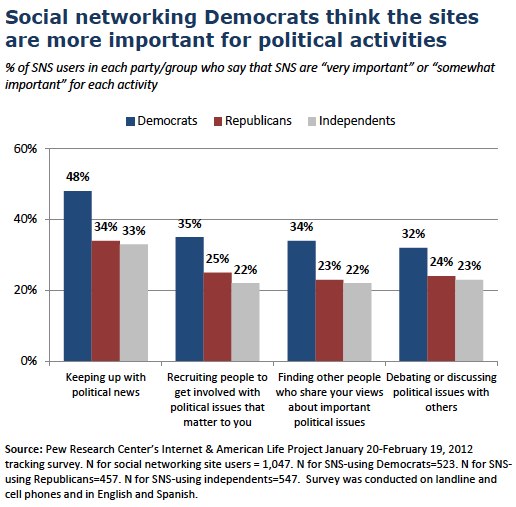Overview
Some but not most users of social networking sites say the sites are important for a variety of political activities:
- 36% of SNS users say the sites are “very important” or “somewhat important” to them in keeping up with political news.
- 26% of SNS users say the sites are “very important” or “somewhat important” to them in recruiting people to get involved in political issues that matter to them.
- 25% of SNS users say the sites are “very important” or “somewhat important” to them for debating or discussing political issues with others.
- 25% of SNS users say the sites are “very important” or “somewhat important” to them in finding other people who share their views about important political issues.
In each activity, Democrats who use social networking sites are more likely than Republicans or independents to say the sites are important.

Two other notable group patterns emerge from these survey questions. SNS-using blacks are significantly more likely than SNS-using whites to feel that the sites are important for these political activities. And younger SNS users (those ages 18-29) are more likely than older site users to think the sites are important in this way.
Use of social networking sites sometimes impacts people’s political views and involvement
- 25% of SNS users say they have become more active in a political issue after discussing it or reading posts about it on the sites.
- 16% of SNS users say they have changed their views about a political issue after discussing it or reading posts about it on the sites.
- 9% of SNS users say they have become less involved in a political issue after discussing it or reading posts about it on the sites.
Democrats and liberals who use social networking sites are more likely than others to say their activities on the sites have led them to become more active: 33% of SNS-using Democrats say this, compared with 24% of both SNS-using Republicans and SNS-using independents. Some 39% of SNS-using liberals say their use of the sites has gotten them more involved in an issue, compared with 24% of SNS-using conservatives and 21% of SNS-using moderates.
The amount of political material users post on social networking sites is relatively small
The vast majority of SNS users (84%) say they have posted little or nothing related to politics in their recent status updates, comments, and links. Only 6% of these users say that most or all of what they posted recently on social networking sites is related to politics, issues, or the 2012 campaign. Another 10% say some of what they have recently posted has been about politics.
A majority of SNS users (59%) say their friends on the sites have posted little or nothing about politics. Only 9% of what their SNS friends share and post is mostly or entirely about politics. In the case of friends’ posts, though, some 30% of SNS users say some of the material from their friends is about politics.
Those who are the most politically engaged get more from social networking sites and feel the impact more
Beyond the context of social networking sites, we asked people in this survey how often they have political discussions with friends and family. Some 33% of all respondents say they “very often” have political discussions with family and friends; 34% say they “sometimes” have such conversations, 20% say they “rarely” talk about politics, and 12% say they “never” talk about politics. Those who talk very often about politics with family and friends are more likely than others to use SNS for political purposes and say their use of the sites has affected them. Here’s what the most politically engaged citizens say about their use of SNS:
- that they post about politics on SNS and are more likely to say that most of the material they post relates to politics;
- that the sites are useful to them in their political activities;
- that they have become more involved in an issue after reading what others have said on social networking sites;
- that their friends’ posts are about politics and that their friends’ posts are compatible with their own political views;
- that they will challenge their friends’ SNS material about politics if the disagree with it;
- that they have been challenged on their own political posts.
About the survey
These are the findings from a survey conducted from January 20-February 19, 2012 among 2,253 adults ages 18 and older, including 901 cell phone interviews. Interviews were conducted in English and Spanish. The margin of error for the full sample is plus or minus 2.3 percentage points. And the margin of error of the sample dealing with social network site users (n=1,407) is plus or minus 2.9 percentage points.




